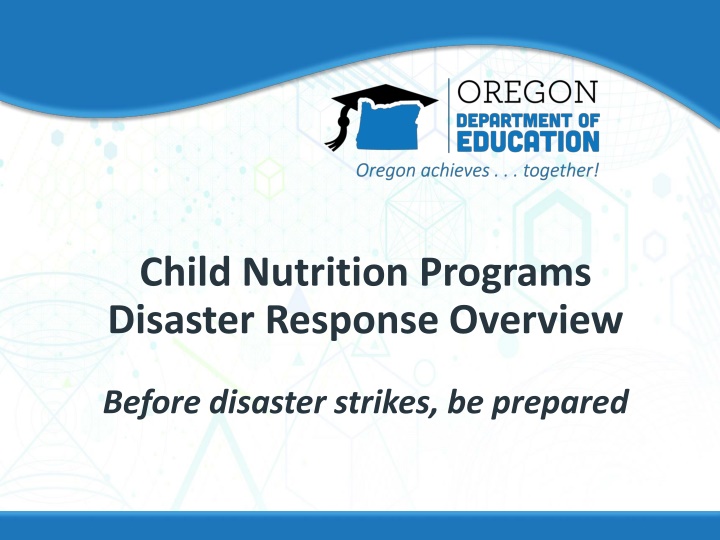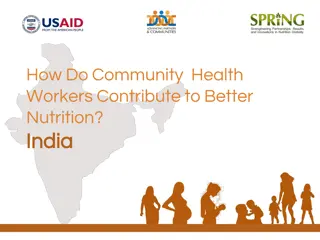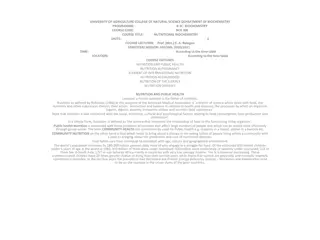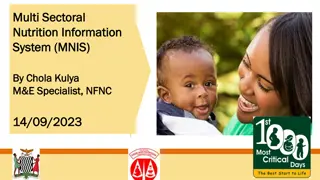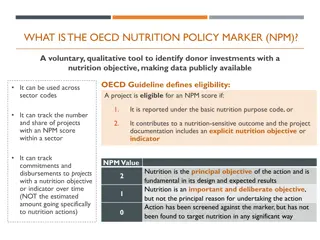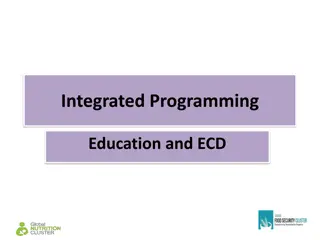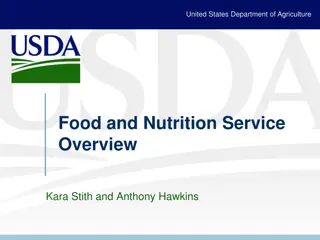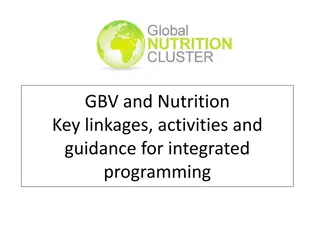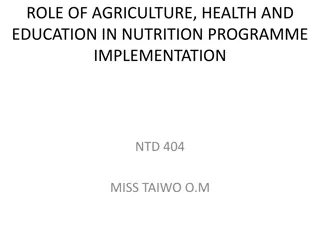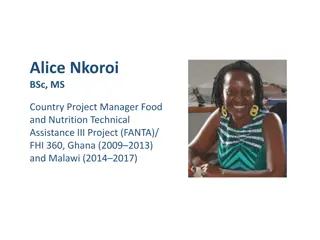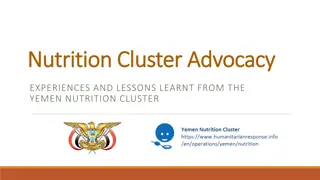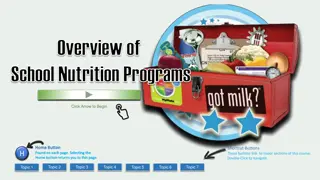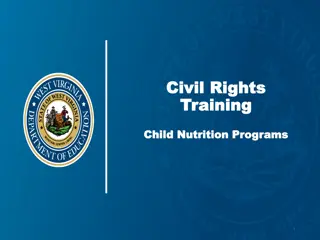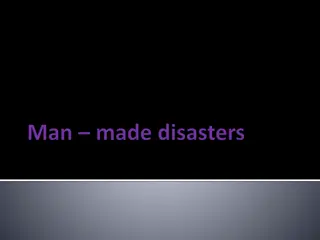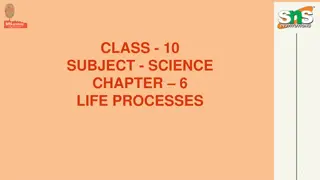Responding to Child Nutrition Programs in Disasters
Learn how Child Nutrition Programs can effectively respond to disaster situations, including utilizing USDA Foods and programs like CACFP, SFSP, and D-SNAP. Discover methods, preparation steps, types of declarations, sources of USDA Foods, and inventory management strategies for efficient disaster response.
Download Presentation

Please find below an Image/Link to download the presentation.
The content on the website is provided AS IS for your information and personal use only. It may not be sold, licensed, or shared on other websites without obtaining consent from the author.If you encounter any issues during the download, it is possible that the publisher has removed the file from their server.
You are allowed to download the files provided on this website for personal or commercial use, subject to the condition that they are used lawfully. All files are the property of their respective owners.
The content on the website is provided AS IS for your information and personal use only. It may not be sold, licensed, or shared on other websites without obtaining consent from the author.
E N D
Presentation Transcript
Child Nutrition Programs Disaster Response Overview Before disaster strikes, be prepared
CNP Disaster Response How can CNP sponsors respond to disaster situations: USDA Foods Child and Adult Care Food Program (CACFP) Summer Food Service Program (SFSP) Seamless Summer Option (SSO) Memo: SP 46-2014, CACFP 12-2014, SFSP 18-2014
USDA Foods Disaster Response USDA s primary methods to respond to nutrition needs of disaster survivors: Congregate Feeding using USDA Foods USDA Foods Disaster Household Distribution Disaster Supplemental Nutrition Assistance Program (D-SNAP)
USDA Foods Disaster Response Preparation Develop a disaster and communication plan Train staff on plan Identify local organization responsible for coordinating disaster feeding in your State, know how to contact them Establish & maintain a list of emergency contact information
USDA Foods Disaster Response Types Presidential declaration Emergency declaration Disaster declaration Situation of distress means a natural catastrophe or other event that does not meet the definition of disaster Sponsor must notify ODE of situation and foods needed
USDA Foods Disaster Response Sources of USDA Foods in Oregon for congregate feeding during disasters and situations of distress: National School Lunch Program (NSLP) Summer Food Service Program (SFSP)
USDA Foods Disaster Response Inventory ODE has authority to collect USDA Foods inventory from: Other sponsor inventory State warehouse Other state warehouse (with FNS approval) Replacement of USDA Foods by USDA is contingent on type of disaster and available funding Above: Picture of Oregon delivery truck delivering USDA Foods to Oakridge School District in the aftermath of a storm in 2019.
USDA Foods Disaster Response Recordkeeping Track and report to the FDP the USDA Foods used in disaster: Material code, description of USDA Foods Number of cases of USDA Foods Note: USDA Foods include USDA DoD Fresh produce and further processed finished end products How many children and adults were served meals using USDA Foods in congregate setting
USDA Foods Disaster Response Recap of Process Notify state FDP on type of emergency and types of USDA Foods needed Sponsor keeps track of USDA Foods used and how many meals were served State locates USDA Foods and arranges delivery
USDA Foods Disaster Response USDA Foods or commercial foods that are damaged or destroyed USDA does not have the authority to replace foods that are lost, destroyed, contaminated, or rendered unusable as a result of a disaster, emergency, or situation of distress Contact insurance provider to file a claim for the lost foods
USDA Foods Disaster Response Conclusion Be familiar with USDA Foods Disaster manual, have a copy readily available Be familiar with ODE USDA Foods Disaster guidance/contact document Educate community on availability of USDA Foods during a disaster/situation of distress Conduct annual training and networking with local disaster feeding organizations Maintain updated 24/7 emergency contact information
USDA Resources 7 CFR Part 250 regulations for USDA Foods disaster assistance programs FNS Disaster Response Assistance web page
CACFP Disaster Response Emergency Shelters Temporary housing to displaced families are eligible to participate in CACFP Application requirements waived All children through age 18 may receive up to three free meals (breakfast, lunch, and supper) each day Appropriate facility A school or an institution not providing actual shelter, but is providing meals to displaced families who are being temporarily housed elsewhere, in locations that may not have the means to provide meal services to these temporary residents.
CACFP Disaster Response Unanticipated School Closures During a school closure (extreme weather, fire, flood, major building repairs, labor-mgmt. disputes, etc), at-risk afterschool centers that normally offer a snack and supper after school may offer either lunch and a snack, or breakfast and a snack Educational or enrichment activities must be offered All meals reimbursed at the free rate Memo: SP 55-2016, CACFP 26-2016, SFSP 18-2016
SFSP Disaster Response Emergency Feeding Sites Sponsors or ODE may determine that operating SFSP or SSO sites would be useful when schools or day care facilities must remain closed due to a disaster situation Expedited approval Sponsors with current agreements to operate SFSP may be approved to open emergency feeding sites
SFSP/SSO Disaster Response Unanticipated School Closures SFSP regulations allow the service of meals during the school year when there are unanticipated school closures Extended to SSO A new applications is not required if the sponsor participated in SFSP at any time during the current year or prior two calendar years Meals reimbursed at the free rate School sites may be used Area eligibility requirements still apply Memo: SP 55-2016, CACFP 26-2016, SFSP 18-2016
SFSP Non-Congregate Feeding Not related to disaster response Excessive heat and exceptional circumstances Demonstration Project Excessive Heat Non-congregate meal service shall be permitted only on days when the National Weather Service (NWS) has issued a Heat Advisory, an Excessive Heat Warning, or an Excessive Heat Watch for the area in which an approved outdoor meal site is located Approved by USDA annually Submit in the Site Info Sheet in CNPweb for approval
SFSP Non-Congregate Feeding Exceptional Circumstances Non-congregate feeding based on circumstances like extreme weather events (wildfires, flooding) Submit request to ODE Requires FNS approval Smoke Waiver ODE submitted a non-congregate waiver to FNS for this year to allow for the service of non-congregate meals for safety reasons served at summer meal sites (SFSP, SSO) in areas experiencing air quality advisories of unhealthy for sensitive groups, unhealthy, very unhealthy or hazardous due to wildfires
Flexibilities Meal Component and Meal Service All Programs If emergency conditions exist that prevent schools, institutions, or sponsors from obtaining fluid milk, ODE may allow service of meals without milk or with an alternate form of milk, such as canned or dry milk NLSP May serve meals that do not meet the menu planning or meal pattern requirements in disaster situations Requires FNS approval CACFP Special variations in the food components of meals Requires FNS approval
Flexibilities Accountability and Verification Claiming May submit claims outside the 60/90-day requirement as a result of a disaster Not subject to one-time exception Destroyed Records Contact ODE Circumstances Dates of the losses Types and age Normal accountability/claiming/monitoring lost Contact ODE Waiver must be submitted to FNS
Flexibilities Site Eligibility Area Eligible School or Census Data May waive the requirement that sponsors document that each site is area eligible For sites located in the area damaged by a natural disaster that must relocate to areas that are not eligible based on school or census data CACFP, SFSP and SSO sites Requires FNS approval SFSP Sites Located at Schools May waive the requirement that SFSP sites may not be located at school sites during an unanticipated school closure, May be approved as a location for emergency feeding
Contact ODE CNP USDA Foods Chris Facha chris.facha@ode.state.or.us Sarah English sarah.English@ode.state.or.us CACFP/SFSP Lynne Reinoso lynne.reinoso@ode.state.or.us Cathy Brock cathy.brock@ode.state.or.us SSO Heidi Dupuis heidi.dupuis@ode.state.or.us All Programs Dustin Melton dustin.melton@ode.state.or.us
In accordance with Federal civil rights law and U.S. Department of Agriculture (USDA) civil rights regulations and policies, the USDA, its Agencies, offices, and employees, and institutions participating in or administering USDA programs are prohibited from discriminating based on race, color, national origin, sex, disability, age, or reprisal or retaliation for prior civil rights activity in any program or activity conducted or funded by USDA. Persons with disabilities who require alternative means of communication for program information (e.g. Braille, large print, audiotape, American Sign Language, etc.), should contact the Agency (State or local) where they applied for benefits. Individuals who are deaf, hard of hearing or have speech disabilities may contact USDA through the Federal Relay Service at (800) 877-8339. Additionally, program information may be made available in languages other than English. To file a program complaint of discrimination, complete the USDA Program Discrimination Complaint Form, (AD-3027) found online at the USDA complaint resolution page, and at any USDA office, or write a letter addressed to USDA and provide in the letter all of the information requested in the form. To request a copy of the complaint form, call (866) 632-9992. Submit your completed form or letter to USDA by: (1) mail: U.S. Department of Agriculture Office of the Assistant Secretary for Civil Rights 1400 Independence Avenue, SW Washington, D.C. 20250-9410; (2) fax: (202) 690-7442; or (3) email: program.intake@usda.gov 155 This institution is an equal opportunity provider.
